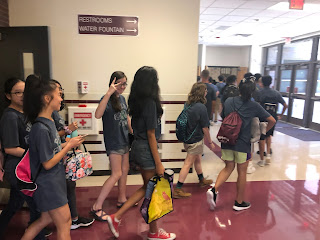It’s impossible to miss Breast Cancer Awareness Month and its frenzy of pink. We are, apparently, also in the middle of International Walk to School Month, National Dental Hygiene Month, National Stamp Collecting Month and about 100 other various special interest celebrations.
October is also Dyslexia Awareness Month, though as anyone who lives with dyslexia can attest, you don’t need 31 days set aside to remember. It’s a year-round, nonstop kind of life that affects an estimated 10% of the population — and there is no cure.
I don’t have dyslexia myself, but as a classroom teacher and mom to two children with the learning disability, I often feel like I’m in the trenches.
Both of my children were diagnosed in elementary school, Cooper in the middle of fourth grade and Katie in the middle of third. Neither showed what I thought were obvious symptoms. They seemed to not only understand texts but could ask insightful questions, make inferences and explain their new learning. Both enjoyed reading, and honestly, there wasn’t much of a choice in our home. We devoted hours each week to board books and picture books, poetry and novels. Stacks of books punctuate every room of our home.
Yet there were struggles at school and with homework. We’d spend a frustrating number of hours studying for spelling tests, only for those words to fall out of their heads the next day. Copying words from the board or a worksheet was a painful experience. Details such commas and capitalization often went unnoticed.
Even after two years of daily intervention at school and many more years of developing coping skills and strategies, challenges remain — as expected. One has more difficulty than the other with written expression. One needs more time and repetition to process nonfiction.
Yet Cooper has incredible spatial awareness and the ability to construct and innovate. Katie thinks and speaks, writes and empathizes with the heart of a poet.
They both have to work harder than most of their peers, and despite extra hours of reading, thinking and studying, they rarely earn grades that reflect that additional effort.
They’re developing layers and layers of resiliency.
The transition this year for Katie from middle school to high school has been understandably tough for all the reasons that incoming ninth-graders toil. New building, different expectations and increasingly difficult classes. She learned quickly that her old study habits wouldn’t support her new coursework, and I was reminded that she needed extra help at home.
After some trial and error, she’s found a method that’s working for memorizing new vocabulary. She creates flashcards early in the unit and relies on repetition — reading the words and definitions to herself, reading them aloud, answering my questions at breakfast and dinner. Last-minute cramming isn’t an option.
Katie studied for hours for a single human geography vocabulary test. Demographic transition models, migration patterns, pro-natalist policies — she’s got them covered (and I’m not so bad at them myself). I wept and cheered when I received her text reporting her test score: 96.
I remind my children — my two Damm kids plus the 73 seventh-graders I teach this year — that everyone is carrying some kind of burden. Some challenges are obvious — complete with T-shirts, bumper stickers and rubber bracelets — but many are hidden. Our community is a better place when we offer grace and compassion to everyone, allowing room for named and unnamed struggles.
There’s nothing wrong with a month of awareness to teach the world about a hobby, condition or disease. Yet there is power in living each day with awareness and compassion for everyone and whatever weighs them down.









